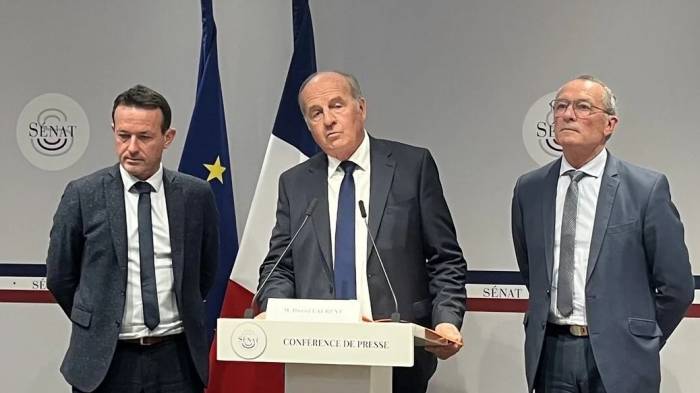Le secteur vitivinicole français génère un excédent de 14,73 milliards d'euros, alors que des voix s'élèvent pour réclamer une réforme
Les sénateurs proposent 23 réformes pour remédier aux problèmes de climat, de concurrence et aux faiblesses structurelles qui menacent le troisième contributeur commercial de la France.
04-11-2025

Les sénateurs français ont publié un rapport présentant 23 recommandations visant à assurer l'avenir de la filière viticole du pays. Le rapport, présenté par les sénateurs Daniel Laurent, Henri Cabanel et Sébastien Pla, est le fruit de plusieurs mois de recherche, de plus de 50 auditions et de 150 réunions avec des acteurs du secteur. Les trois sénateurs sont eux-mêmes viticulteurs et représentent différents groupes politiques. Ils affirment que leurs propositions sont conçues pour répondre aux défis profonds auxquels est confrontée la viticulture française.
Les sénateurs soulignent plusieurs causes à l'origine de la crise actuelle du secteur vitivinicole. Celles-ci comprennent le changement climatique, l'évolution des habitudes de consommation, l'intensification de la concurrence internationale et une série de chocs économiques tels que la pandémie de COVID-19, la guerre en Ukraine et les tensions commerciales avec les États-Unis et la Chine. Selon le rapport, l'aide publique a souvent été utilisée pour aider le secteur à surmonter ces crises, mais ce soutien ne suffit plus à masquer les faiblesses structurelles sous-jacentes.
L'une des recommandations les plus importantes est d'organiser des assises nationales de la viticulture en 2026, sous la supervision du ministère de l'agriculture. Ces assises réuniraient les producteurs, les négociants, les distributeurs, les coopératives, les banques et les institutions publiques. L'objectif est de créer un "pacte sectoriel" qui rétablirait le dialogue entre les différents acteurs de la filière. Les sénateurs estiment que ce type d'accord est nécessaire pour que tous les acteurs, des viticulteurs aux négociants, prennent en charge l'avenir du vin français.
Le rapport suggère également d'ouvrir les organismes de défense et de gestion (ODG), qui contrôlent actuellement les normes de production des appellations, aux acteurs de l'aval, tels que les négociants et les distributeurs. Ils auraient ainsi leur mot à dire dans les décisions de production. Dans des régions comme la Champagne, cela pourrait signifier donner aux négociants un rôle plus important dans la prise de décision, une mesure qui s'est toujours heurtée à la résistance des syndicats de viticulteurs locaux.
Les recommandations portent également sur la compétitivité internationale. Les sénateurs notent que si la France est en tête des exportations de vin en valeur, elle est à la traîne de l'Italie et de l'Espagne en termes de volume. Ils appellent à une stratégie nationale unifiée pour promouvoir le vin français à l'étranger sous une seule et même bannière. Cette approche refléterait les efforts déployés par d'autres grands pays producteurs de vin qui présentent un front uni sur les marchés mondiaux.
Parmi les autres recommandations clés figurent la poursuite des efforts de prévention et de traitement des problèmes de santé mentale chez les agriculteurs, la simplification des procédures administratives pour les producteurs de vin, la subordination des aides publiques à la coopération au sein du secteur, la promotion des contrats entre producteurs et distributeurs pour sécuriser les circuits de vente, le passage d'initiatives isolées d'arrachage de vignes à des stratégies régionales collectives, et l'évaluation rigoureuse des financements publics pour en garantir l'efficacité. Le rapport préconise également des politiques fiscales stables pour le secteur vitivinicole.
La filière vitivinicole française est complexe, avec 236 ODG qui gèrent 442 appellations d'origine protégées (AOP) et indications géographiques protégées (IGP), ainsi que 23 organisations interprofessionnelles. Malgré cette complexité, les vins et spiritueux français détiennent 17 % du marché mondial et ont généré un excédent commercial de 14,73 milliards d'euros en 2023, soit l'équivalent de 49 Airbus A380, ce qui en fait le troisième contributeur à la balance commerciale de la France.
Les sénateurs citent le Cognac et la Champagne comme exemples de régions où une forte organisation entre les producteurs et les négociants a été couronnée de succès. Dans ces régions, des négociations annuelles déterminent la quantité que chaque producteur peut produire en fonction de la demande du marché. Les sénateurs suggèrent que ce modèle pourrait inspirer des réformes plus larges dans l'ensemble du secteur vitivinicole français.
Les négociations nationales proposées pour 2026 devraient marquer un tournant pour la viticulture française. Les sénateurs soulignent que leur rapport n'est pas une simple étude mais un outil pour une véritable réforme. Ils estiment que seules des solutions concrètes permettront de préserver ce qu'ils décrivent comme un atout économique et un héritage culturel pour la France.
Fondée en 2007, Vinetur® est une marque déposée de VGSC S.L. qui a une longue histoire dans le secteur du vin.
VGSC, S.L., dont le numéro de TVA est ESB70255591, est une entité inscrite au registre du commerce de Saint-Jacques-de-Compostelle, Spagna.
Email: [email protected]
Sede e uffici a Vilagarcia de Arousa, Galice.